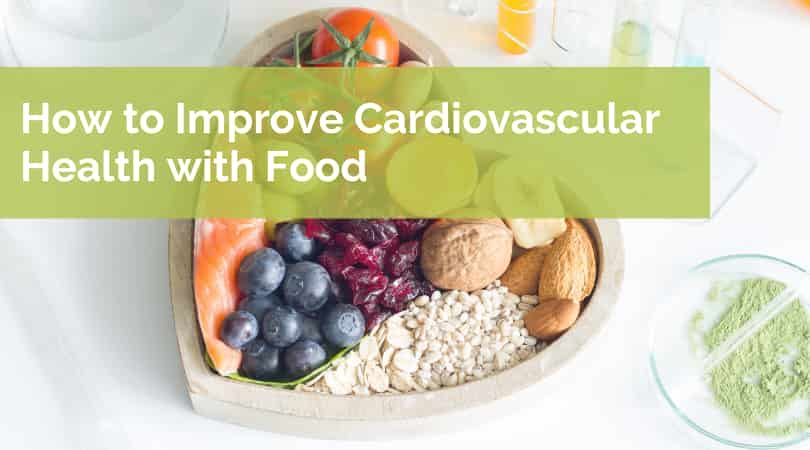
Heart disease is the number one cause of death worldwide. Improving cardiovascular health should therefore be a main focus when you are looking to adopt a healthier lifestyle.
What is Cardiovascular Health?
The cardiovascular or circulatory system encompasses the heart, blood vessels, and blood. It is the system that pumps oxygen and nutrients throughout the body and helps remove waste products.
Keeping your heart healthy and blood flowing properly can help the rest of your body get the nourishment it needs and prevent buildup of toxins.
Unfortunately, there are several conditions that impact the cardiovascular system. These include:
- Hypertension or high blood pressure
- Atherosclerosis or buildup of fatty plaque in the heart and veins/arteries
- Heart failure caused by weak or damaged heart muscles
- Impaired or ruptured blood flow to the brain (also known as a stroke)
Increasing cardiovascular health by eating heart healthy can help reduce your risk of these conditions.
Eating Heart Healthy
What is a heart healthy diet and how do I follow it? The first and most important component to a Heart Healthy diet is to increase your intake of fresh fruits and vegetables. By incorporating a variety of fruits and vegetables that span all the colors of the rainbow, you are adding crucial vitamins and minerals that actively work to protect your heart. Here are some of the benefits that come from fruits and veggies:
- High in potassium, important for regulating blood pressure (May not be appropriate if you have renal disease, see your MD or RD for more details)
- Low in sodium, important for lowering blood pressure
- Mostly fat free or rich in healthy fats.
- High in fiber, which lowers blood cholesterol
- Low in calories to assists with weight loss or maintenance.
- High in vitamin K to help prevent calcium buildup in the arteries and maintain adequate bloods consistency.
Following a heart healthy or plant-based diet does not mean you need to be vegetarian or vegan. Simply increasing the amount of vegetables in your daily routine, experimenting with new meatless recipes or exploring alternatives mealtime routines can make a huge difference. Here are some tips that will help you on your path towards a heart healthy diet.
- Start Meatless Mondays
- Add a small side salad with your meals
- Experiment with salad dressings (Salads should be a tasty treat and not a tedious task)
- Eat more beans and lentils
- Add raw or cooked veggies to your favorite foods (omelets, burgers, pizza, pasta)
- Follow a vegan or vegetarian social media account (you might find exciting new recipes)
- Re-discover your favorite grocery store (many stores carry delicious and simple to prepare vegan and vegetarian meals)
- Start your own garden (growing your own food can add to the fun of eating healthy)
In recent years, research has shown that a moderate amount of animal fats will not have as much of an impact on cardiovascular disease as once believed. In fact, eating quality protein sources such as lean grass-fed beef or wild salmon can provide omega 3 fatty acids which combats inflammation and promotes heart health. Sugar and refined carbohydrates may actually be a bigger contributor to the development of heart disease and can contribute to other comorbidities such as diabetes which increases the risk of a heart attack or stroke.
A more balanced approach to improving cardiovascular health is to follow a Mediterranean diet which focuses on fruits, vegetables, whole grains, healthy fats, and lean meats/fish. It also recommends reducing the amount of processed foods, red meat and refined carbohydrates. This eating pattern has been found to significantly decrease the risk of heart disease as it is loaded with anti-inflammatory, heart-healthy nutrients that have also been shown to reduce the risk of cancer. Along with the dietary changes, this lifestyle includes other components that are helpful to the heart, like daily exercise and a slower (less stress filled) way of life. A Mediterranean diet is often seen as the gold standard for optimal health and has been studied for its benefits all around the world.
The goal with improving cardiovascular health is to make dietary changes that are sustainable as lifelong habits. Being able to enjoy your favorite foods along with a hearty variety of fruits and vegetables is the best way to nourish your mind, body, and soul.
References:
DiNicolantonio JJ, Lucan SC, O’Keefe JH. The Evidence for Saturated Fat and for Sugar Related to Coronary Heart Disease. Prog Cardiovasc Dis. 2016;58(5):464-472.
Martínez-González MA, Gea A, Ruiz-Canela M. The Mediterranean Diet and Cardiovascular Health. Circ Res. 2019;124(5):779-798.
- Should You Take Whey Protein Powder After Surgery? - March 2, 2023
- How Much Protein is Too Much? - January 30, 2023
- Is Whey Protein Keto Friendly? - January 30, 2023





